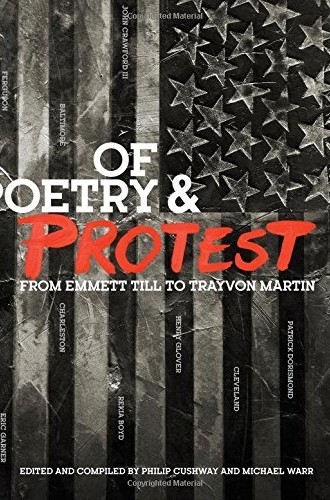Can the world be saved by poetry?
I was skeptical. Then I heard a poet read one of his poems.
I admit that I was wary as I headed into the Poetry Foundation’s media breakfast this morning. Our recent political climate has driven me toward many things, ranging from despair-driven paralysis to a cautious hopefulness as I see people converging around principles of openness, generosity, and resistance. It hasn’t driven me toward poetry. I love poetry, but as we face the rapid institutionalization of xenophobic hatred, the idea of poetry has seemed to me too wispy and idealistic, not urgent or active enough.
But at the breakfast this morning, poet and high school teacher Ruben Quesada read one of his unpublished poems, which was a stunning instance of protest. His poem wasn’t wispy. It was urgent, and it was active. Quesada, who recently organized Writers Resist in Chicago, writes: “our voice carries weight and resonance. Our voice can manifest change.” He’s talking about activists here, but he could also be speaking of artists. As I listened to Quesada recite his poem, I thought about how poetry can function as a form of protest.
I went back to my office and looked at a book that has been on my shelf, Philip Cushway and Michael Warr’s compilation Of Poetry and Protest: From Emmett Till to Trayvon Martin. The poems and essays in this anthology are written by 43 African American poets who are still living (or, in the case of two of the poets, were still living when the anthology was being compiled). These poets push against convention and deconstruct stereotypes to unravel the assumptions that have built a culture of violence against black men. Full-page candid photographs of the poets are juxtaposed with their words, alongside historic photos and artwork reflecting the history of black Americans’ struggles. The book is suffused with echoes of Gwendolyn Brooks. It’s a striking collection of beauty and protest.
In her prose poem “No Wound of Exit,” Patricia Smith exegetes the medical examiner’s report for a black teenage boy whose body lies in the morgue: “There is no wound of exit. A black boy can fold his body around a bullet. The cartridge is a pinpoint of craving, a sort of little love, some slugs are warmer than mothers,” Smith writes. “1300 milliliters of blood in the right pleural cavity and 1000 in the left pleural cavity; the collapse of both lungs. A black boy’s lungs collapsing. A mother picking up a phone. The same sound.” The boy in the poem could be Trayvon Martin or Michael Brown. Or it could be any other one of the thousands of boys who die of gun violence each year. Against our tendency to conflate all these boys into a single, mind-numbing statistic, Smith reminds us of their personality, their uniqueness. “The face is unremarkable. Correction: The black face is suppressed fireworks.”
The temptation to look at a black face and see only generic blackness is not unique to white people. Toi Derricotte, in “A Note on My Son’s Face,” recalls the moment she stared at her infant son and saw that “his face was too dark, / nose too broad, mouth too wide.” As she gazed at her son’s face, she realized that he wasn't going to save her from her own darkness, from the legacy that she had inherited from her grandparents. She confesses, “I wanted that face to die, / to be reborn in the face of a white child. . . . / I crowed: My Son! My Beautiful! / But when I peeked in the basket / I saw the face of a black man.”
The photographs of the male poets in this volume, taken by Victoria Smith, dismantle the idea that there is any such generic thing as “a black man.” There are only black men—and in these photographs, their eyes sparkle, their mouths hint at smiles, their faces tell multiple stories.
At the same time, Harryette Mullen’s “We Are Not Responsible,” first published in 2002, demonstrates how people in positions of power fail to see the humanity of those over whom they assert their authority. This poem speaks particularly poignantly into the tumultuous events of recent days: “You were detained for interrogation because you fit the profile,” Mullen writes. “Your ticket does not guarantee that we will honor your reservations.” Remain calm, the officer advises a single breath after stripping away the rights of the person being detained.
The poems in this volume are lament more than celebration; they diagnose the problem without offering solutions. But they also speak spiritedly, with anger grounded in the hope for something better. In other words, they protest. Perhaps that kind of approach is just what we need in a time such as this.







